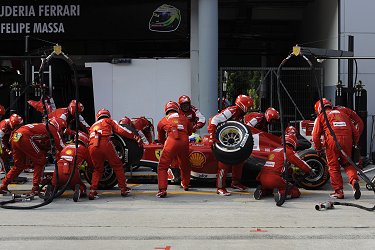17.5.13
 These are difficult times for people with poor memories. Maybe it’s because of the huge amount of information available today that people are too quick to talk, forgetting things that happened pretty much in the recent past. Or maybe the brain cells that control memory only operate selectively, depending on the results achieved on track by their owners. These are difficult times for people with poor memories. Maybe it’s because of the huge amount of information available today that people are too quick to talk, forgetting things that happened pretty much in the recent past. Or maybe the brain cells that control memory only operate selectively, depending on the results achieved on track by their owners.
A classic example of this is the current saga regarding the number of pit stops. Voices have been raised to underline the fact that various teams, some of whom got to the podium and others who were quite a way off, made four pit stops in the recent Spanish Grand Prix, making the race hard to follow.
It’s a shame that these worthy souls kept quiet two years ago when, at the very same Catalunya Circuit and on the Istanbul track, five of the six drivers who got to those two podiums made exactly the same number of pit stops as did Alonso and Massa last Sunday in the Spanish Grand Prix.
In fact, there’s nothing new about winning a race making so many pit stops, even discounting those where it was down to changeable weather. One only has to look back to 2004, when Michael Schumacher won the French Grand Prix thanks to what was a three stop strategy, later changed to a four stopper. That was the key which allowed the multiple champion’s F2004 to get ahead of the then Renault driver, Fernando Alonso, who made three stops. And on that day and we remember it well, our strategy and the tyre supplier were showered with praise for allowing us to get the most out of the car.
Today however, it seems one must almost feel ashamed for choosing a strategy that, as always for that matter, is aimed at getting the most out of the package one has available. On top of that, if this choice emerges right from the Friday, because all the simulations are unanimous in selecting it, then why on earth should one feel embarrassed when compared to those who have gone for a different choice, only to regret it during the race itself.
|